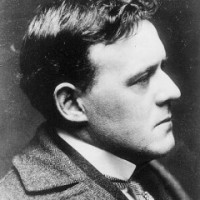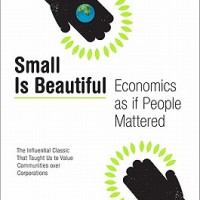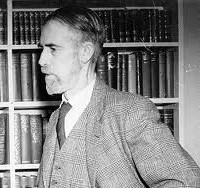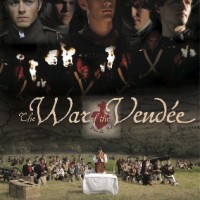An author too robust and significant to be wholly un-personned can still be marginalized. Consider this elegant pasquinade, which years ago won a parody-contest award in Britain’s New Statesman and which employs the same rhyme scheme and meter as Hilaire Belloc’s own “The chief defect of Henry King”:
The chief defect of dear Hilaire
Was not the clothes he used to wear,
The curious hat and monstrous cloak,
Paraded as some kind of joke.
No, Hilaire’s fault, and well he knew it,
Was, all he did, he’d overdo it…
There’s more—he held the strongest views
On politicians, and on Jews,
Such as, today, might give one cause
To think of Race Relations Laws.
But that of Belloc is the worst
That can be said.
His comic verse,
His Cautionary Tales, his Peers,
His Beasts will last for countless years,
Delighting readers old or young
Who share Hilaire’s adopted tongue.
Well, that’s put Dear Hilaire back in his box, hasn’t it? If Belloc’s entire literary merit lies in his having catered to the A.A. Milne and Edward Lear demographic, we need no more bother ourselves with his wider aims than seek deep epistemological insight from re-reading about Pooh Bear or The Dong With The Luminous Nose. But then the New Statesman has never claimed theological expertise. Others, who do possess such claims, and who in many instances share Belloc’s Catholicism, have been at least as hostile. Malcolm Muggeridge complained, “although he has written about religion all his life, there seemed to be very little in him.” Six years before the Latin Mass’s recent anti-Belloc enfilade, St. Louis University’s James Hitchcock (in the May 1996 issue of Crisis) likened Belloc to “a man with a machine gun—by spraying shots everywhere he inevitably hit some targets, but many of his bullets went astray.” This allegation can at any rate be argued over, unlike certain antics of the occasional self-confessed Belloc fan. (Such as John Anderson, who passed as the doyen of Australian philosophy during the 1930s, 1940s, and 1950s and who labored with surrealistic persistence to reinterpret Belloc’s Servile State as a sacred text for antipodean atheist head-kickers. When Belloc’s friends included historical illiterates like Anderson, he hardly needed foes.)
How stands the case for the prosecution? In particular, was G.M. Trevelyan, Regius Professor of History at Cambridge 1927-1940, justified in having flatly called Belloc “a liar”?
Occasionally, alas, yes. Belloc confided as much himself, to a co-religionist at that: the British historian, newspaperman, and editor Douglas Woodruff. While going several debating rounds in print against his merciless ultra-Protestant detractor, the once-celebrated controversialist G.G. Coulton, Belloc came out with one assertion so breathtakingly implausible that it moved Woodruff to inquire, “But is it true?” “Oh, not at all”, Belloc retorted. “But won’t it annoy Coulton?” Such a deliberate, impolitic falsehood clearly sprang from insensate bravado rather than from malice. It is doubtful, moreover, whether the historian who hastily and occasionally deceives others is half as dangerous as the historian who consistently and lucratively deceives himself. (Many a reader obligated to plow through the unrelenting sanctimony of more recent and more fashionable gurus than Belloc—Arthur Schlesinger expounding the immaculate conception of JFK; Eric Hobsbawm assigning a similar redemptive role to the proletariat; Francis Fukuyama hyperventilating about free-market dogma’s limitless appeal to any polity, however Lower Slobbovian—must have felt increasingly inclined to welcome from these sources an honest lie or two.) Still, Belloc’s mendacity at that juncture defies excuses and leaves behind a singularly nasty odor.
An even graver sin, curiously slighted by Belloc’s most recent biographers, A.N. Wilson (Hilaire Belloc, 1984) and Joseph Pearce (the shorter, more reverential Old Thunder: A Life of Hilaire Belloc, 2002), occurs repeatedly in Belloc’s analyses of the French Revolution. Notwithstanding the fervor with which pope after pope—especially, in Belloc’s youth, St. Pius X—had declared support for Jacobins and indeed Girondins to be incompatible with the most basic Christian decency, Belloc remained as eupeptic as any Charles James Fox about the entire pageant of French politics from the Bastille’s fall via Robespierre to Napoleon. Revolutionary genocide against the Vendéens and Chouans scarcely touched Belloc’s consciousness. On his last (1937) tour of the U.S., he accused Americans of wanting to hear “48,376,277 times…that war is all wrawng and why cahunt everyone in Yurrup live peaceably same as us; that Religion don’t count same as it useter ’cos there’s more enlight’nment now.” So he could perceive, and denounce, lunatic world-saving Wilsonian optimism when it fell from his hosts’ lips. Why that optimism somehow became acceptable when the increase in “enlight’nment” had been effected by the guillotine, instead of by American presidential overreach, Belloc never explained.
This all amounts to a grim indictment. What case for the defense can outweigh it? There actually exist two such cases: first, Belloc’s daunting percipience; second, his equally daunting versatility as a poet.
Read the complete article in The Imaginative Conservative
Posted on Feb 13th, 2013 in
Economy,
Philosophy,
Politics |
0 comments
A little over a century ago, on August 16, 1911, the great visionary economist E. F. Schumacher was born in the German city of Bonn. An icon of the early Green movement, few people seem to know that Schumacher’s vision was inspired by the great papal encyclicals of Leo XIII and Pius XI or that Schumacher himself was a convert to Catholicism.
Disgusted with the Nazis, Schumacher moved to England before the beginning of the second world war and remained there for the remainder of his life. Best known for his international bestseller,
Small is Beautiful, published in 1973, he is, without doubt, one of the most influential thinkers of the twentieth century. The enormous impact of
Small is Beautiful, which became the bible of a new generation of environment-conscious politicians, economists and campaigners, makes it one of the most important books of its time. Jimmy Carter, following his election to the presidency in 1976, invited Schumacher to the White House for a photo-shoot. Pictures of Carter and Schumacher, arm in arm, were splashed across the newspapers, indicating, so the president would have us believe, that he was in tune with the latest thinking on “economics as if people mattered”, which was the sub-title of Schumacher’s book.
There was, however, a secret behind Schumacher’s book that his millions of admirers did not know. It was a secret that some of them would not wish to know. It was, in fact, a secret that many of them still want to keep secret. The shocking secret is that Schumacher was hugely influenced in his writing of Small is Beautiful by the teaching of the Catholic Church, a fact that appears to remain a major embarrassment to today’s E. F. Schumacher Society if its deafening silence on the subject is anything to go by.
At first skeptical that the popes ‘in their ivory tower’ could have anything of worth to teach him in the sphere of economics, Schumacher read Leo XIII’s Rerum novarum (1891) and Pius XI’s Quadragesimo anno (1931) and was astonished at the insight that the social teaching of the Church had to offer. It was, however, the promulgation of another Papal Encyclical, Paul VI’s Humanae vitae (1968), which would have the most immediate impact on his life. This Encyclical prompted his wife and one of his daughters to seek instruction in the Catholic faith. The message that Humanae vitae conveyed, wrote Schumacher’s daughter, ‘was an affirmation and support for marriage, for women … who had given themselves entirely to their marriages and who felt acutely the pressure from the world outside that shouted ever louder that homebound, monogamous relationships were oppressive to women and prevented them from “fulfilling themselves”.’ Although, at the time, Schumacher did not feel able to follow his wife and daughter into the Church, he concurred with their view of the Encyclical. ‘If the Pope had written anything else,’ he told a friend, ‘I would have lost all faith in the papacy.’
On 29 September 1971 Schumacher was finally received into the Catholic Church. Two years later his worldwide bestseller was published, a work, both popular and profound, which almost single-handedly redefined the public perception of economics and its impact upon the human person and his environment. It is, in fact, ironic that the modern environmental or ‘green’ movement derives its weltanschauung not from any ‘new age’ philosophy or neo-pagan ‘religion’ but from the expertise and wisdom of a world-renowned economist who found inspiration from the social doctrine of the Church.
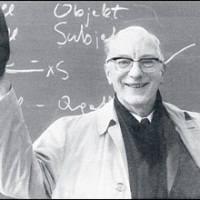
Eric Voegelin often is regarded as a major figure in 20th-century conservative thought—one of his concepts inspired what has been a popular catchphrase on the right for decades, “don’t immanentize the eschaton”—but he rejected ideological labels. In his youth, in Vienna, he attended the famous Mises Circle seminars, where he developed lasting friendships with figures who would be important in the revival of classical liberalism, such as F.A. Hayek, but he later rejected their libertarianism as yet another misguided offshoot of the Enlightenment project. Voegelin has sometimes been paired with the British political theorist Michael Oakeshott, who greatly admired his work, but he grounded his political theorizing in a spiritual vision in a way that was quite foreign to Oakeshott’s thought. Voegelin once wrote, “I have been called every conceivable name by partisans of this or that ideology… a Communist, a Fascist, a National Socialist, an old liberal, a new liberal, a Jew, a Catholic, a Protestant, a Platonist, a neo-Augustinian, a Thomist, and of course a Hegelian.”
But whatever paradoxes he embodied, Voegelin was, first and foremost, a passionate seeker for truth. He paid no attention to what party his findings might please or displease, and he was willing to abandon vast amounts of writing, material that might have enhanced his reputation as scholar, when the development of his thought led him to believe that he needed to pursue a different direction. As such, his ideas deserve the attention of anyone who sincerely seeks for the origins of political order. And they have a timely relevance given recent American ventures aimed at fixing the problems of the world through military interventions in far-flung regions.
Voegelin was born in Cologne, Germany in 1901. His family moved to Vienna when he was nine, and there he earned a Ph.D. in political science in 1922, under the dual supervision of Hans Kelsen, the author of the constitution of the new Austrian republic, and the economist Othmar Spann. He subsequently studied law in Berlin and Heidelberg and spent a summer at Oxford University mastering English. (He commented that his English was so poor when he arrived that he spent some minutes wondering why a street-corner speaker was so enthusiastic about the benefits of cheeses, before he realized the man was preaching about Jesus.) He then traveled to the United States, where he took courses at Columbia with John Dewey, Harvard with Alfred North Whitehead, and Wisconsin with John R. Commons, where he said he first discovered “the real, authentic America.”
Upon returning to Austria, he resumed attending the Mises Seminar, and he published two works critical of the then ascendant doctrine of racism. These made him a target of the Nazis and led to his dismissal from the University of Vienna after the Anschluss. As with many other Austrian intellectuals, the onslaught of Nazism made him leave Austria. (He and his wife managed to obtain their visas and flee to Switzerland on the very day the Gestapo came to seize his passport.) Voegelin eventually settled at Louisiana State University, where he taught for 16 years, before coming full circle and returning to Germany to promote American-style constitutional democracy in his native land. The hostility generated by his declaration that the blame for the rise of Nazism could not be pinned solely on the Nazi Party elite, but must be shared by the German people in general, led him to return to the United States, where he died in 1985.
During his lifelong search for the roots of social order, Voegelin came to understand politics not as an autonomous sphere of activity independent of a nation’s culture, but as the public articulation of how a society conceives the proper relationship of its members both to one another and to the rest of the cosmos. Only when a society’s political institutions are an organic product of a widely shared and existentially workable conception of mankind’s place in the universe will they successfully order social life. As a corollary of his understanding of political life, Voegelin rejected the contemporary, rationalist faith in the power of “well-designed,” written constitutions to ensure the continued existence of a healthy polity. He argued that “if a government is nothing but representative in the constitutional sense, a [truly] representational ruler will sooner or later make an end of it… When a representative does not fulfill his existential task, no constitutional legality of his position will save him.”
For Voegelin, a truly “representative” government entails, much more crucially than the relatively superficial fact that citizens have some voice in their government, first of all that a government addresses the basic needs of “securing domestic peace, the defense of the realm, the administration of justice, and taking care of the welfare of the people.” Secondly, a political order ought to represent its participants’ understanding of their place in the cosmos. It may help in grasping Voegelin’s meaning here to think of the Muslim world, where attempts to create liberal, constitutional democracies can result in Islamic theocracies instead: the first type of government is “representative” in the narrow, constitutional sense, while the second actually represents those societies’ own understanding of their place in the world.
Voegelin undertook extensive historical analysis to support his view of the representative character of healthy polities, analysis that appeared chiefly in his great, multi-volume works History of Political Ideas—which was largely unpublished during Voegelin’s life because his scholarship prompted him to change the focus of his research—and Order and History. This undertaking was more than merely illustrative of his ideas, since he understood political representation itself not as a timeless, static construct but as an ongoing historical process, so that an adequate political representation for one time and place will fail to be representative in a different time or for a different people.
Posted on Jan 29th, 2013 in
Academy,
History,
West |
0 comments
Christopher Dawson wrote with two different audiences in mind. He sought both to displace the bankrupt Victorian and Edwardian liberalism of his own day and to shake the complacency of his coreligionists who preferred to bask in the quickly fading light of false medievalism. His carefully crafted prose revealed a nuanced and original understanding of Western history.
To combat “scientific” theories of progress, Dawson argued that every civilization relies on those who most fully represent its ideals and shape the culture through their actions. Dawson maintained that “history is at once aristocratic and revolutionary. It allows the whole world situation to be suddenly transformed by the action of a single individual.” It is this dynamic historical process that is fatal to a secular understanding of religious approaches to history. In the words of Edmund Burke that Dawson quoted with approval, at times a “common soldier, a child, a girl at the door of an inn have changed the face of the future and almost of Nature.” To the Christian, this understanding of historical development permits interpretation of past events in the light of divine will and spiritual forces that may be unknown even to the actors themselves.
Dawson set out for himself the task of explaining the twofold nature of Christian history: while the Christian faith embodies eternal values and the teachings of God, it nevertheless transforms utterly the cultures it contacts. When the Christian faith enters into a culture, as when it first burst upon an overcivilized and jaded Rome, it begins a spiritual regeneration that affects not only the material, external culture, but the interior constitution of its members. In an essay entitled “The Christian View of History,” Dawson wrote:
For the Christian doctrine of the Incarnation is not simply a theophany—a revelation of God to Man; it is a new creation—the introduction of a new spiritual principle which gradually leavens and transforms human nature into something new. The history of the human race hinges on this unique divine event which gives meaning to the whole historical process.
This new, world-transforming history overthrows its rivals, whether the Greek idea of an endless series of repeating cycles or the spiritless homogeneity of the “postmodern” era. The Incarnation gives shape to history and supplies a beginning, a middle, and an end: “the Christian view of history is a vision of history sub specie aeternitatis, an interpretation of time in terms of eternity and of human events in the light of divine revelation.” This concentration on the physical substance of the Christian faith was a conscious counterweight to overly aesthetic theories of Christianity, such as the “super-Christianity” of Matthew Arnold, for example, which reduced the force of religious belief to a set of humanistic nostrums.
The figures whom Dawson chose to study highlight his interest in the transformative power of the Christian faith: St. Augustine, who formed Christian thought out of the ruins of the old world order; St. Thomas Aquinas, whose reception of the Greek-Arabic body of scientific knowledge created a new movement in Western thinking without compromising its integrity; and St. Ignatius Loyola, who inaugurated a new spirituality to confront the challenges of the Reformation. Dawson saw the present age as one similar to that of Augustine or Ignatius, and in need of saints who have the vision to lead the faithful into the next era. The Western world, he thought, was facing another of its “cultural discontinuities” that displace the old order and usher in a new social reality. The question that remained, for Dawson as for Eliot, was whether this new era was to be Christian or a “new civilization which recognizes neither moral laws nor human rights.”
Dawson wished first to reassert the importance of a millennium of Christian belief to modern history. It is not necessary to be a Christian to recognize that Christianity has played a profound role in shaping European culture and that “there is no aspect of European life which has not been profoundly affected” by that faith. Dawson sought to counter the skeptics of his day who saw in Christianity at best a series of moral tales (and at worst mere pretexts) that had no lasting influence on Western social practice or political arrangements. This aspect of his writings won him many admirers, including T. S. Eliot and Arnold Toynbee.
Posted on Jan 28th, 2013 in
France,
History |
0 comments
If a thing is worth doing at all, it’s worth doing badly…
This paradoxical witticism of Chesterton was on my mind as I sat down to watch The War of the Vendée, a recent film about the forgotten martyrs of the French Revolution. I was pleased that a film had been made to honour the heroes of the Vendée but I feared that it would be a really bad film. Certainly everything seemed to suggest that it would be awful. It was made with a miniscule budget and a cast of dozens as opposed to thousands. How could a couple of dozen actors realistically depict a battle scene or the slaughter of thousands of Catholics by Robespierre’s terrorists? Worse still, the film’s director, Jim Morlino, had decided to use only child actors. Wasn’t this a recipe for disaster? Oh well, I thought as I hit the play button, if a thing is worth doing at all, it’s worth doing badly…
Fearing the worst, I found myself charmed by the film, and was moved to tears of sorrow for the fate of the martyrs of the Catholic Resistance but also to tears of laughter at the moments of comic relief.
As I watched the child actors playing husbands and wives, and even grandparents, I realized that you had to see the film through the eyes of a child in order to see it at all. This is emphatically not to suggest that the film is childish but that we adults have to become childlike in order to enter the kingdom of truth that the film presents to us. We have to suspend our disbelief, walking through the wardrobes of our imagination into a world where the eternal verities shine forth with innocence and wonder.
As I allowed my own imagination to wander through the wardrobe of wonder, I found myself, to my surprise, not in Narnia but in Middle-earth. The romantic and rustic depiction of life in the villages of the Vendée became, for me, a reincarnation of the Shire. Once this connection had been made, the child actors became hobbits, halflings who faced the French revolutionary dragons with an unsophisticated innocence. I am sure that something of this vision was in the mind of Morlino, who depicts the evil Robespierre as being demonically possessed, as no doubt he was. Robespierre is as unsophisticatedly evil as the peasants of the Vendée are unsophisticatedly good.
There is a price to pay for this unabashedly pure approach to the problem of evil, such as a loss of the nuanced niceties that historical accuracy demands (and should demand), but the price is well worth paying. Deep down, at the bedrock level of truth, the French Revolution was as evil as anything that the Fellowship of the Ring had to face. Its bloodthirsty secular fundamentalism set the scene for the bloodletting of the next two centuries. In its insatiable war on the Faith, secularism began with the guillotines and the Great Terror and metamorphosed into the Gulag and the gas chamber. Today, of course, it attacks the Faith and the Family and is systematically exterminating the weak and disabled members of society through the plague of abortion.
Make no mistake, Robespierre was one of Satan’s greatest servants and the villagers of the Vendée were certainly on the side of the angels. As such, we can be sure that both sides in this epic struggle between good and evil now have their reward. Robespierre would be killed by the same orcs that he had unleashed on the Vendée and his fate after death might be too horrible to contemplate. The heroic villagers of the Vendée, butchered in their thousands by the hordes of revolutionary orcs, are now in the company of the saints, martyrs and angels.
